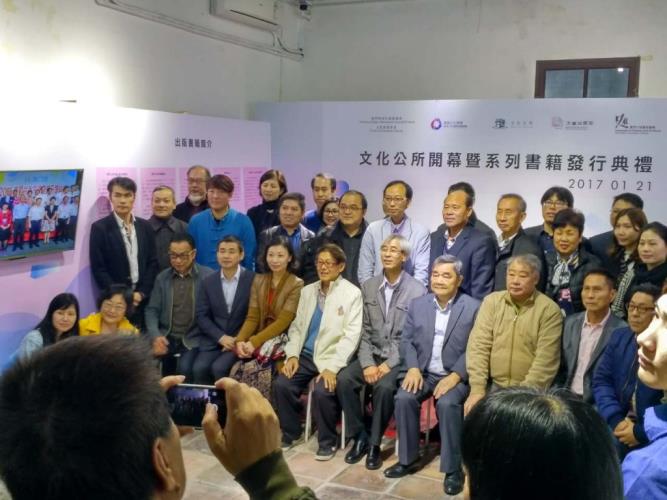A full time researcher in university and an amateur art commentator, Cheong obtained his master’s degree in Public Policy at Willy Brandt School of Public Policy at the University of Erfurt and is formerly a clarinettist of the Erfurt Philharmonic Orchestra in Germany. He loves classical music and now serves as conductor of the orchestra in Escola Choi Nong Chi Tai, by which he can connect art to everyday life. Cheong is also a book lover.

Book launch of An Oral History of the Concert Band in Macao
Pursuing an academic career is not easy, as it requires years of reading and writing. In the face of the ever-changing knowledge, thesis writing has to be as comprehensive and exhaustive as possible before publication in academic journals. Besides being an academia, I engage in creating art to leave a positive impact on others, a process in which I find my greatest sense of satisfaction outside the academic world. These all encourage me to keep creating art.
I collaborated with the Macao Band Directors Association a few years ago to compile An Oral History of the Concert Band in Macao, a book that prides itself in preserving the contemporary history of concert bands in the city. Frankly, we faced quite many hurdles during the publication process. The positioning of the title had been changed from an academic publication to a mass-appeal book, while we were striking a balance in the academic value of the book. Fortunately, we found a graduate assistant working in university, who had completed a master’s dissertation on the topic—Origin and Development of Students’ Concert Bands in Contemporary Macao—that adopted an oral history approach with a literature review to detail the development of contemporary concert bands. Presenting the development in an organised manner in text, the dissertation showcases the historic value of the segment and serves as a relevant source material for future researchers. I am deeply touched by that.
As a writer with an academic focus, I derive an explanatory theoretical framework from research and practice with an empirical review. In addition to my major areas of work, I have been interested in arts since childhood and I am grateful I could apply this skill set at my work to make contributions to the development of concert bands in the city. Supported by the Macao Band Directors Association, and sponsored by the Macao Cultural Affairs Bureau and the Macao Foundation, I have interviewed a number of prominent figures in the Macao music industry for the book. From discourses and historic photos to documents and scores, these fragments form a whole picture of the industry albeit its incompleteness, embodying the spirits of a generation of musicians. These interviewees include 90-year-old composer Doming Ngok Pui Lam, who is hailed as one of the five Asian composing masters, and Veiga Jardim, a former conductor of the Macau Chamber Orchestra.
I have gained a new perspective of the history of the music industry from the in-depth exchanges with each interviewee. During the interviews, I understood the accomplishments of many music and art professionals during the contemporary music development of the city——many exhilarating moments in their vicissitudes of life. Amid the robust development of Macao after the handover, the contributions of some individuals may be unknown to the public, but their devotion behind the scenes are worthy of a chapter in history; in the future, I will continue interviewing different art professionals to preserve their accounts.
Following the publication of the book, we have received many feedbacks from experts and senior figures in the industry. One of the limitations of the book is that the data provided by the interviewees does not include all those making contributions to the development of local concert bands, and as a result, the book could only illustrate part of the history. We hope we could enrich the content in the future. Besides, there is room for improvement in the historical framework of the book due to the present lack of a complete timeline of major events in the history of local concert bands. At last, the book is mainly based on memories of the interviewees——although their stories have been fact-checked with documents and photos, some parts are yet fully validated. Thus, this book can be further polished with feedbacks from more researchers and interested parties. Fortunately, we have received many precious suggestions after the book hit the shelves, and we believe we can improve our work in the future to make bigger contributions in preserving the music history of Macao.